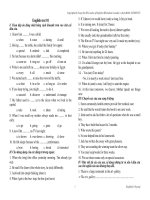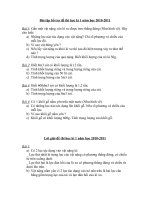Unit 4 Getting started bai tap bo tro
Bạn đang xem bản rút gọn của tài liệu. Xem và tải ngay bản đầy đủ của tài liệu tại đây (122.2 KB, 4 trang )
<span class='text_page_counter'>(1)</span>UNIT 4 LIFE IN THE PAST GETTING STARTED VOCABULARY: New words. Pronunciation. Meaning. 1. Preserve (v) Preservation (n) Preservative (adj) 2. Generation (n) Generation gap 3. Entertainment (n) Entertain (v) 4. Occasion (n) Special occasion 5. Wealthy (adj) = rich (adj) 6. Loudspeaker (n). /prɪˈzɜːv/. to keep something in its original state in good condition. /ˌdʒenəˈreɪʃn/. 7. Express (v) Expression (n). /ɪkˈspres/. 8. Agreement (n) Agree (v) with sb about sth # disagreement (n) Disagree (v) 9. Appreciation (n) Appreciate (v). /əˈɡriːmənt/. all the people who were born at about the same time films/movies, music, etc. used to entertain people; an example of this a special event, ceremony or celebration having a lot of money, possessions, etc. a piece of equipment that changes electrical signals into sound, used in public places for announcing things, playing music, etc. to show or make known a feeling, an opinion, etc. by words, looks or actions the state of sharing the same opinion or feeling. 10. Participate in (v) = take part in = join Participation (n) 11. Marriage (n) Marry sb (v) = sb get married 12. Arrange (v) Arrangement (n) 13. Feather (n). /pɑːˈtɪsɪpeɪt/. 14. Fiction (n) Science fiction # Non-fiction (n) 15. Take/have a bath (idm) Bathe (v) 16. Hole (n). /ˈfɪkʃn/. /ˌentəˈteɪnmənt/ /əˈkeɪʒn/ /ˈwelθi/ /ˌlaʊdˈspiːkə(r)/. /əˌpriːʃiˈeɪʃn/. pleasure that you have when you recognize and enjoy the good qualities of somebody/something to take part in or become involved in an activity. /ˈmærɪdʒ/. the legal relationship between a husband and wife. /əˈreɪndʒ/. to plan or organize something in advance one of the many soft light parts covering a bird’s body a thing that is invented or imagined and is not true. /ˈfeðə(r)/. BrE /bɑːθ/ AmE /bæθ/ /beɪð/. to wash something with water, especially a part of your body a hollow space in something solid or in the surface of something. Vietnamese meaning Giữ gìn, bảo tồn.
<span class='text_page_counter'>(2)</span> 17. dig-dug-dug (v). /dɪɡ/. 18. Technological (adj) Technology (n) 19. Distance (n) From a distance 20. Funeral (n). /ˌteknəˈlɒdʒɪkl/. 21. Bride (n). /braɪd/. 22. Groom (n) = bridegroom (n). /ɡruːm/. 23. Attendant (n) Attend (v) Attention (n) Pay attention to (idm) 24. Relative (n) Relate (v) Relation (n). /əˈtendənt/. Guest (n). /ˈrelətɪv/. a person who is in the same family as somebody else. /ˈdɪstəns/ /ˈfjuːnərəl/. to make a hole in the ground or to move soil from one place to another using your hands, a tool or a machine connected with technology the amount of space between two places or things a ceremony, usually a religious one, for burying or cremating (= burning) a dead person. I/ Use the words in the box to complete the sentences. Preserve / Generation / Entertainment / Occasion / Appreciation / Wealthy / Participate / Technology / Relative / Marriage 1. Only after I did research about my family tree, I found out that John was my distant__________of mine. 2. The couple are said to be fabulously__________as they have won lottery worth 5$ billion 3. All of her children's __________ ended in divorce. 4. My __________ have grown up without the experience of a world war. 5. He was presented with the watch on the __________ of his retirement. 6. We encourage students to __________ fully in the running of the college. 7. There will be live __________at the party. 8. She shows little ___________ of good music. 9. The government are trying to make use of the most modern __________. 10. Efforts to __________ the peace have failed in the Northern part of Russia. II/ Phonetics: 1. A. Relative 2. A. technological. B. Preserve B. Generation. C. Generation C. dug. D. Express D. Arrange.
<span class='text_page_counter'>(3)</span> 3. A. preservation 4. A. Appreciation 5. A. Arrange. B. expression B. Environmental B. agree. C. occasion C. Preservation C. Marry. D. fiction D. Participation D. attendant. III/ Reading Choose the correct answer - a, b, c, or d. Last week I made the mistake of visiting the village where I grew up. It was a small, friendly community with two farms and a number of old cottages round the village green. I realized very quickly that although in many ways it appears unchanged, in reality hardly anything is the same. All the pretty cottages are there, of course, and both the picturesque farmhouses. But none of the inhabitants are country people. All of them are commuters, who leave early every morning for the nearby town. Neither of the farmhouses is attached to a farm these days; the land has been sold and is managed by somebody in an office somewhere who has little interest in the village itself There are a few new houses, but they have no local character; you can see the same style anywhere in the country. The whole of the village, in fact, has been tidied up so much that it has become nothing more than just another suburb. 1. The writer_______________ a. like living in a farmhouse. c. grew up in a small rural community.. b. used to live in a cottage. d. came back from the village.. 2. When he revisited his village, he quickly realized that a. the village changed a lot in appearance. b. everything has almost changed c. all the pretty cottages as well as the farmhouses have been rebuilt. d. the residents of the village are all commuters. 3. Neither of the farmhouses___________________ a. has a connection with a farm. b. has been sold. c. is attached to the farmers, d. is managed by the commuters. 4. According to the writer,______________ a. the village now has no local character. c. the village is more tidy than it used to. b. the village has become nothing but a suburb. d. all the new houses are the same style. 5. Which of the following is not mentioned in the passage? a. The writer has visited the village several times before. b. The writer revisited his village last week. c. The village has undergone significant changes. d. The village nowadays has become another suburb. Choose the one option - a, b, c or d - that best completes the passage. The world is divided (1)_............ two main parts: one part is poor and the (2).......... is rich. The poor countries (3).......... 'the developing countries'. The big problem that they have to (4)............. is lack of food and medical care. A lot of people do not have (5)_.......... food to eat and medicine to cure illnesses. In some parts, children are (6).............. starving. The land of those countries is (7)_ ............ cultivate anything on. They do not know (8) ....................... new farming Methods as well as inventions and discoveries of science and technology.(9) ...............,they do not have enough money to do it. They certainly need help from (10)............countries. 1 . a. into 2. a. another 3. a. call 4. a. meet 5. a. very 6. a. even 7. a. poor enough to 8. a. applying 9. a. However. b. to b. other b. have called b. discuss b. too b. also b. so poor as to b. to apply b. Moreover. c. in c. others c. called c. encounter c. many c. such c. enough poor to c. how to apply c. Therefore. d. from d. one d. are called d. do d. enough d. all d. too poor to d. how applying d. As a result.
<span class='text_page_counter'>(4)</span> 10. a. rich. b. the rich. c. another rich. d. a rich.
<span class='text_page_counter'>(5)</span>








